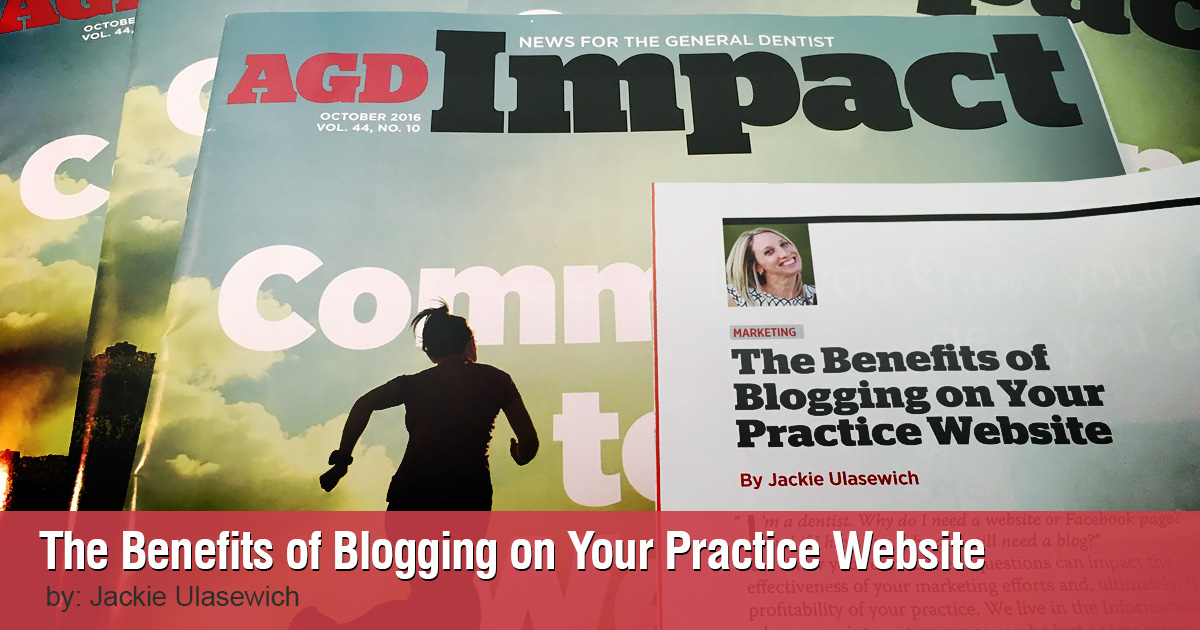This article originally appeared in the August/2016 issue of the Academy of General Dentistry’s AGD Impact magazine.
“I’m a dentist. Why do I need a website or Facebook page? And if I have one, why do I still need a blog?”
How you react to these questions can impact the effectiveness of your marketing efforts and ultimately, the profitability of your practice. We live in the Information Age, where your internet presence can be just as important as the physical location of your practice and where potential patients can find you within seconds. And when they do find you, you should want them to see a consistent social media presence, a strong, organized website and, potentially, an up-to-date blog.
Benefits of Launching a Blog
Being relevant to current and prospective patients is an ongoing process. Since most of them will research you and your practice online before even making an appointment, what they see while they are searching should reflect your practice in the best possible light.
A blog is an important element of your website because it serves many purposes. Not only does it establish the dental expertise of you and your staff and position you as a thought leader, but it also builds trust and credibility with your patients, while increasing your internet visibility and brand awareness. Your blog is your public forum, and it provides the ideal opportunity to offer advice and tips to patients on their oral health.
When launching a blog, it is important that you house it on your own website, not on a separate site. If you’re not sure how best to do that we’d highly recommend reaching out to your web developer for some assistance. It’s usually very easy (and inexpensive) for a professional to add a blog to most websites. It does nothing to improve your practice website’s ranking or searchability if it is hosted on another platform. Keep in mind that constantly updating your blog and, in turn, your website with fresh content improves your search engine optimization (and, thus, your Google ranking), increases the potential for growing your site visitors (because they know you have up-to-date, quality information) and helps give you a leg up on your competition. A stale site and an unchanged, boring blog repels — as opposed to attracts — patients, defeating the purpose of blogging in the first place. Make your blog an ongoing part of the maintenance of your practice website.
Even with all of these benefits, your blog may not necessarily be an instant success in attracting new patients. It takes time to build a following, but eventually, the blog will help increase the awareness of your practice, its services, and other dentistry-related information. So don’t be discouraged if your blog doesn’t take off immediately. Continue to be consistent in offering blog content.
Blogging Best Practices and Tips
Let’s look at your actual blog and the possibilities it affords. Follow the “KISS” rule, and keep it simple — from the look and layout of the blog to the language you use in each post. At the same time, blog posts should be interesting and relatable, and the language that you use in your blog posts should be easy for Google to understand. Yes, Google. The search engine considers both readability and the users’ experience and determines how effective a Google search will be in reaching your website. One part of this is using keywords. Without doing in-depth keyword research, we’d suggest using keywords such as “dentist”, “dentist ”, “dentist , ”, etc. These are likely the most popular keywords being searched in your region. Keywords are essential to searchability on particular topics, but adding words without purpose or overstuffing your blog with these key terms decreases your ranking with search engines and makes your site look like spam. The most effective method of implementing keywords into your text is to write intelligently and with the reader in mind.
Because your blog is an effective marketing tool, its visibility is of paramount importance. Share it with others. Post it on your practice’s social media pages, or make it part of your monthly email campaigns. The greater the exposure, the greater the likelihood the reader will seek the source: your website.
Control the length of your blog posts. Try to write at least 300 words each time you blog. More would be better, but don’t get verbose — your blog is not the place for your first novel. Too many words can turn off your readers just as easily as too few, encouraging them to find more interesting sites that offer engaging information that also can be easily digested. Examples of topics you could write about include: the benefits of dental implants (if that’s a service you provide), how to determine if your patient is a candidate for veneers or other dental procedures, or dental prevention and the big picture. Talk with your patients, and find out what interests them. Or another good place to start is by considering some of the common questions patients ask you and your staff members.
We know how busy people are and the likelihood is that they will skim your blog, so make it easy for them to gain the important nuggets of information quickly. Use visuals, bullet and numbered lists, and bold subtitles that will allow them to scan your blog and maintain their attention.
And while you are doing that, don’t make it dry. Put your personality into the blog. Make it personal, and don’t forget your call to action. Tell them what you want them to do (for example, access a resource that’s provided on your website). Don’t assume they already know what your call to action is.
How often you blog is also important. Once a month is recommended as a minimum, but the more often you can do it, the better. At least once a week would be optimal.
If you lack either the time or ability to write an effective blog post, hire a dental marketing professional or agency who can help make your blog a powerful part of your marketing efforts.












